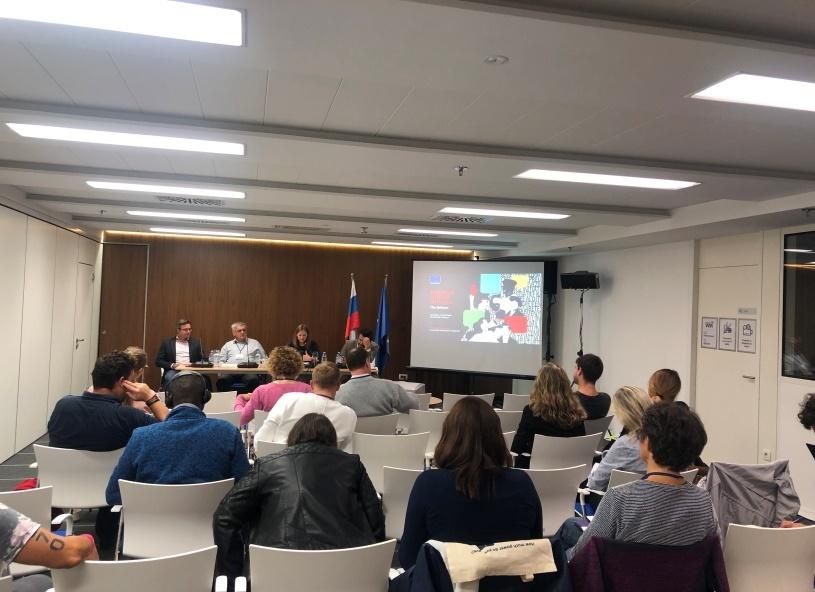
On 24 September 2019 the European Citizens' Initiative team headed to Ljubljana to hold a workshop on the European Citizens' Initiative and participatory democracy in Europe and Slovenia. The event involved NGO’s representatives and citizens eager to play a bigger role in the EU policy-making and find out tips and tricks for coordinating a successful initiative.
Citizen-powered democracy in Europe and Slovenia
The event kicked off with a debate, moderated by Tomaž Deželan, Associate Professor of Political Science at the Faculty of Social Sciences at the University of Ljubljana, brought together European and national experts in participatory democracy - Simon Delakorda, Executive Director of the Institute for Electronic Participation in Ljubljana, Branko Gerlič, organiser of the Unconditional Basic Income (initiative) and Charlotte Rive, Policy officer for the European Citizens’ Initiative at the European Commission.
Charlotte Rive started with a presentation of the European Citizens’ Initiative and its new regulation. As of January 2020 the procedure will be simplified and the tool will be more accessible to citizens and organisers.
Next, the discussion focused on similarities and differences between the European Citizens’ Initiative and the Slovenian Citizens' Initiative; challenges, solutions and best practices on participatory democracy in Europe and Slovenia; and concrete examples of previous citizens’ initiatives.
In particular, Branko Gerlič shared his valuable experience on the Unconditional Basic Income initiative launched in 2013, which aimed to encourage cooperation between the EU countries in order to explore Unconditional Basic Income as a tool to improve their social security systems.
This was followed by an informal brainstorming session, during which participants actively discussed challenges and came up with ideas of how to coordinate a successful citizens’ initiative.
Choosing the right topic is key to reaching 1 million signatures
The main challenge identified for organising a citizens’ initiative on EU level is the goal of gathering 1 million signatures. Therefore, smaller countries with less population such as Slovenia, must count on the support of larger countries in order to meet this challenging requirement. This is exactly why, Branko Gerlič explained, the Unconditional Basic Income initiative failed in gathering the necessary statements of support. The initiative was not successful in bigger countries like Germany and France. In proportion to their population the most successful were Bulgaria and Slovenia.
This shows that it is also a matter of choosing the right topic, which needs to be relevant to all countries the initiative targets and as tangible and fundamentally relevant as possible. A good example is the Right2Water initiative. Water is essential to life and everyone perceives it not as a commodity but as an inalienable right, which made it such a success in terms of support.
Creating a grassroots movement and involving youth
The participants pointed out that a large-scale grassroots movement across the countries involved is another key factor to raise the needed funds and widen the partnership. They stressed that civil society needs to be involved, through a variety of activities such as events, flash mobs, crowdfunding initiatives, social media actions. etc. In this respect, they also highlighted that Slovenia’s NGO sector is very active locally and therefore it is more effective to start off as a grassroots movement and find support within a local community before taking in to the national and the EU level.
The speakers also drew attention to the contribution of youth to policy-making. The emblematic case of the young activist Greta Thunberg clearly shows that although many young people under 18 are eager to make their voice heard, they can only use “informal methods” of participation such as demonstrations due to legal barriers to a formal role and participation in the political life. Consequently, they remain marginalised from formal tools such as voting or the European Citizens’ Initiative. The new regulation of European Citizens’ Initiative, the European Commission has opened the possibility for each EU country to lower the age of citizens allowed to support initiatives to 16.
Genuinely engaged and experienced partners make a difference
Raising funds and building international partnerships are two key aspects, which participants discussed. They highlighted that an international network of partners is crucial not only for promoting the initiative, but also for supporting the fundraising.
One challenge in this regard is that most organisers volunteer their time to such campaigns on top of their regular jobs or along other projects, which is something to be taken into consideration when building the core team and planning the budget needed.
Organisers should look for partners who are genuinely engaged in the topic and eager to put all their efforts in promoting it. The partners should also be experienced in promotional campaigns as this is sometimes underestimated, while it can make or break an initiative.



Leave a comment
To be able to add comments, you need to authenticate or register.